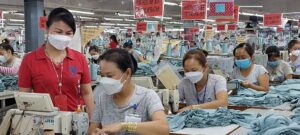LONG AN, Vietnam – Le Thi Gai has been working in Chutex International Co., Ltd (Long An branch) for approximately 10 years. In 2015, after years of commitment and good performance, she was promoted to a line supervisor position. However, Gai’s career promotion path has not been straightforward. To achieve and hold a higher-level position at the sewing line requires a lot of her time and effort to continuously self-teach through trial and error, sharpening the necessary soft skills and technical knowledge, and mastering leadership and communication skills. Gai is managing this all while contributing to improving productivity for production lines. Furthermore, like many Vietnamese women, she has to balance family responsibilities and manage the challenges of socio-cultural norms about gender roles that may also hinder her career progression. Gai takes care of three children at home while continuing working in the factory, which is challenging to constantly balance. This proved especially difficult during Gai’s training with the Gender Equality and Returns (GEAR) programme, yet GEAR also has proved to enhance skills that have since positioned Gai to manage work and life more effectively.
In many local provinces and villages in Vietnam, generations still believe that the burden of housework and childcare should fall on the women’s shoulders. Many men were taught at their young age that housework was the responsibility of the women, and men were the primary wage earners. As a result, even if women are working outside of the home, this prejudice still stands in the way of gender equality. These long-held cultural norms remain one of the biggest challenges in enhancing women’s voice and empowerment.
“After work, I have to take care of three children and help them with studying at home. It is not easy to find the balance spot between work and life,” Gai says. “However, my husband is understanding and supportive. He shares the housework and encourages me during the training period, which is a big motivation to boost my career advancement.”

“Although I have been working as a line supervisor for a few years, I was very surprised to learn about the amount of useful knowledge and skills getting from GEAR course,” Gai says. Gai is among 35 trainees who participate in the GEAR phase IV training programme. GEAR combines technical knowledge and skill training with a focus on increased line-level productivity and better job opportunities for women in the garment factories. The dual goals of GEAR are to boost overall business performance in the long term, and to empower women to take on leadership roles in the factory.
GEAR – an initiative of Better Work – started in Bangladesh in 2016 and was adapted for Vietnam in 2019. Under the support of the United States Department of Labor (USDOL), GEAR has completed its third and fourth phase covering 16 garment factories in the North and South Vietnam, which aim to equip potential female line supervisors with necessary skills to perform this role effectively, thus leading to improved line productivity and career progression. The training covers a wide range of topics including production management, enhanced productivity, effective communications, workplace management, and quality control. “In addition to the technical knowledge, each trainee is able to learn and practice some soft skills like communication, which is critical for a good line supervisor to manage workplace harmony on the sewing line. Now, I am able to better communicate and handle conflicts in my team by practicing listening and effectively managing workload of each team members” she says. “After the course, I also set specific goals for both my personal life and career progression. I believe that embracing a learning mindset and ‘never backward, always forward’ attitude will eventually lead to success despite the difficulties that I have to go though.”
The GEAR phase IV training course was carried out during the peak of COVID-19 wave in Vietnam, which forced many factories to halt most production due to pandemic control measures. However, despite the negative effects of COVID-19 during the training period, 6 out of 35 trainees received the promotion opportunity to a higher position after the training course . Trainees are also offered monthly coaching sessions to refine their skills and monitor how far they have progressed in terms of line efficiency, quality rate, continuous improvement initiatives, and the career promotion roadmap. In the next phase of the programme, which was less affected by the pandemic, an average of 54.6% trainees were appointed into the management position or higher immediately after the training
“I have learned a lot, including principles for workplace efficiency and removing bottlenecks,” Gai says. “I used to complain a lot when we encountered line bottlenecks without taking time for investigation, which might cause unnecessary stress for the workers. Now, I take time to find out the root cause – usually machine or worker-related issues – then work out a solution and communicate it to all team members.”
Gai’s supervisor also clearly sees how the skills and knowledge from GEAR has affected her performance: “Although Gai has been managing the sewing line for a few years, she has managed to do the job solely based on work experience without any proper technical training. I nominated her for this training, as I feel that she has a great spirit for learning,” she says. “Gai is now able to identify the system’s constraints, and assign proper workloads to each work station to maintain line balance.”
In the context of the unpredictable pandemic situation and the resultant employment crisis affecting Vietnam, many garment factories have been and will continue to experience disruptions. The GEAR program will prove its efficacy to the extent that factories embed the key GEAR methods into their operations. Continuous improvement, creativity and innovation with a focus on gender equality promotion and women’s empowerment can be the key to help the factories to achieve safe production and flexible adaptation – even in the most challenging times.